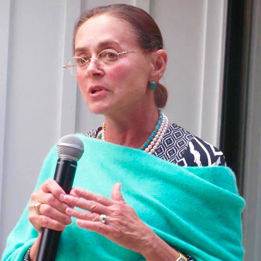
By Fletcher Word
Sojourner’s Truth Editor
“The arts are not just entertainment,” says Suzanne Rorick, executive director of the Toledo Opera and this year’s YWCA Milestones honoree for the Arts. “We are employers; we want to help advance some of the issues of the day; we want to help the cause of social change; we want to address racism; we have an important role to play and we have to be more than just entertainment.”
Rorick has worked in the non-profit arts/culture sector for 30 years and joined the Toledo Opera management staff 20 years ago as Director of Development. Ten years ago, she was named executive director and, during that decade, Rorick and the Toledo Opera have made a concerted effort “to expand our civic footprint – to use our art to expand our audience,” she says.
Specifically, that effort has resulted in a greatly increased number of Black artists in the Opera’s productions as well as several recent productions of Black-themed operas, including the recent premier of I Dream – an opera about the last 36 hours in the life of Martin Luther King, Jr.
As a YWCA 2021 Milestones: A Tribute to Woman honoree for the Arts, Rorick embraces the YWCA’s mission of “eliminating racism and empowering women.”
“That’s why it’s more crucial now than it’s ever been to make the arts truly relevant and inclusive for everyone,” she says in her acceptance speech for this week’s awards ceremony to be held virtually on Friday, March 26.
That effort to make the arts “truly relevant and inclusive for everyone” took a dramatic turn in 2014 when the Toledo Opera Board added Thomas Winston, then the chief financial officer of the Toledo Lucas County Port Authority, as the board’s co-treasurer.
Winston, recalls Rorick, urged the Opera to focus on increasing the number of Black artists and Black-themed works. So, the recent uptick in such performances, she adds “has been intentional – a call to action.”
When Winston joined the board, he was the only Black member at that time. The ensuing years have seen an expansion in those numbers as well. Currently other Black members include John Jones of HOPE Toledo; Willie McKether, PhD, vice president for diversity at the University of Toledo; Ashley Futrell, an attorney with Shumaker Loop & Kendrick, LLP; Adrienne Green, operations leader in Building Solutions at Owens Corning (and a 2016 Milestones honoree for Volunteerism) and Zahra Collins of the Toledo Urban Federal Credit Union.
“My joining the board certainly was part of a strategic emphasis for all the right reasons,” says Thomas, who is now CEO of the Port Authority. “It weas unequivocally and unabashedly good for the Opera to review its strategic focus. A requirement for sustainability is expanding our bandwidth to promote diverse operas and artists in order to expand subscribership.”
The recent surge in Black artistic presence began in 2015. “Porgy and Bess really started it,” says Rorick of that Gershwin classic. But the 2019 rhythm and blues I Dream opera, music and libretto by Douglas Tappin, kicked the Opera’s efforts at cultural expansion into high gear. Tappin is a black composer and former barrister from the United Kingdom who relocated with his family to Atlanta 18 years ago to attend Mercer University and immerse himself in the spiritual aspect of composing.
“I Dream forever changed our idea of what we can do and what we should do,” says Rorick. The aftermath of the I Dream production saw the creation of a Community Engagement Committee, a diverse group of community members to provide input into the inclusion effort.
The organization’s Toledo Opera on Wheels, which takes the arts to youth in the area, is also part of the effort to broaden the overall appeal of opera to the community at large.
As Rorick explains, opera has such universal appeal if the community can be made aware. “Opera take us on a journey outside of ourselves,” she adds in her acceptance speech. “By bringing us together and inviting us to immerse ourselves in its powerful storytelling together, opera can expand our collective imagination in ways that endure long after we leave the theatre.”
Recent years have brought to the Toledo Opera not only Black-themed productions but also a bevy of Black singers. Derrick Davis, Victor Ryan Robertson and Ken Overton sang the parts of Martin, Hosea and Ralph, respectively, in I Dream. Overton also sang the part of Jake in Porgy and Bess. Brian Major has been on stage for Magic Flute, Carmen and La Boheme.
Alicia Russell was the resident soprano during the 2018-19 season and appeared in Magic Flute, The Ballad of Baby Doe and had a major role in Carmen, Frusetta. She returned for La Boheme, the Opera’s last production before the pandemic hit, in the role of Musetta.
Darren Stokes, a prominent bass-baritone appeared in the 2016-17 season production of The Marriage of Figaro in the title role.
Laquita Mitchell has been a virtual regular in lead roles on the Valentine stage. This soprano sang Bess in Porgy and Bess, Countess Rosina in The Marriage of Figaro and Coretta in I Dream.
Now comes Blue.
Next February, during the 2021-22 season, the Toledo Opera, says Rorick, will bring this very acclaimed opera to town. The two-act work, with music by Jeanine Tesori and libretto by Tazewell Thompson was first performed at the Glimmerglass Festival in 2019 and received the Music Critics Association of North America 2020 Award for Best New Opera.
Blue is about a Black family in Harlem who lose their teenage son as the result of a police shooting. The cast members will include Krysty Swann and Allen Michael Jones; Chelsea Tipton II, the former resident director with the Toledo Symphony, will return to Toledo to conduct and Tazewell Thompson, the librettist who is first and foremost a renowned stage director, will be the director.
The Toledo Opera has taken such action “not just by chance” says Rorick. It’s part of the plan these days.
“The mission of the YWCA is to eliminate racism,” says Rorick. “That has to be all our mission.”









